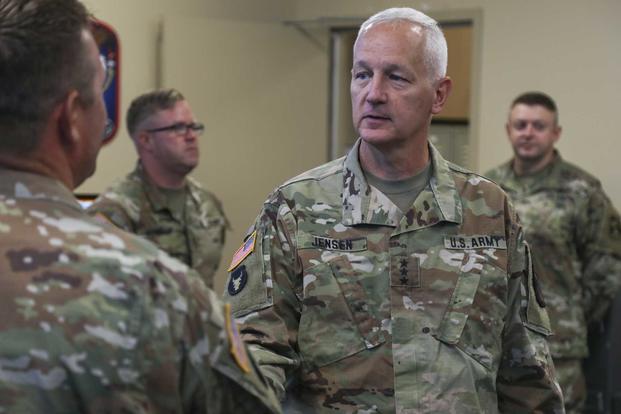Lt. Gen. Jon Jensen, director of the Army National Guard, said Tuesday that taking part in the insurrection on Jan. 6, 2021, was antithetical to the Army's values and there's no room for those soldiers who participated to continue their service. Yet, the service component's top leader conceded that the decision to boot soldiers rests with the adjutants general of the states where those soldiers serve.
At least two National Guard soldiers were part of the pro-Trump mob that ransacked the U.S. Capitol in an attempt to subvert the peaceful transfer of power. Neither of those soldiers has been removed from the force, with leadership in their respective states allowing them to continue service.
"It's obvious that extremism does not match the Army Values," Jensen said during an interview with the Center for a New American Security, a Washington, D.C.-based think tank. "As it relates to any particular case, I really have to defer to each of those adjutants general that are responsible for those decisions. But I can tell you we take extremism very seriously in the National Guard. There's no place for extremism inside of our ranks."
Read Next: Army's Controversial Fitness Test Might Become Official This Year, Leaked Plan Says
Pfc. Abram Markofski -- an infantryman who serves in Delta Company, 1st Battalion, 128th Infantry Regiment, a National Guard unit based in River Falls, Wisconsin -- was sentenced in December to two years' probation and $1,500 in fines and restitution on one count of violent entry and disorderly conduct at the Capitol.
Wisconsin's adjutant general, Maj. Gen. Paul Knapp, who has the authority to remove Markofski, has allowed him to continue his service.
"Out of respect for the civilian judicial process, the Wisconsin National Guard allowed due process to play out, and the chain of command is now contemplating its courses of action based on the outcome," Maj. Joe Trovato, a Wisconsin Guard spokesperson, told Military.com in an email. "This is currently an open and ongoing personnel matter."
During a trial tied to Markofski's actions on Jan. 6, multiple soldiers who have served with him -- including his platoon leader, 2nd Lt. Joel Stevenson -- penned character statements to the Department of Justice, saying he should be able to continue his military career.
Cpl. Jacob Fracker -- a Virginia infantryman assigned to 1st Battalion, 116th Infantry Regiment, 116th Infantry Brigade Combat Team -- admitted to being in the mob in multiple social media posts, even posting selfies of himself and a co-defendant in the Capitol during the assault.
Fracker faces charges of obstruction of an official proceeding; aiding and abetting; entering and remaining in a restricted building or grounds; disorderly and disruptive conduct in a restricted building or grounds; violent entry and disorderly conduct in a Capitol building or grounds.
Maj. Gen. Timothy Williams, Virginia's adjutant general, has allowed Fracker to continue to serve while the charges are adjudicated. However, Fracker is forbidden from taking part in any military duties until his case is resolved.
"If there is sufficient evidence, the [Virginia National Guard] will pursue an administrative discharge action against Fracker," Cotton Puryear, a Guard spokesperson, told Military.com in a statement. "If not, the administrative board will wait until his case is adjudicated in civilian court to take any further action."
Some other troops among those who broke into the Capitol have been dismissed by their respective branches, including Timothy Hale-Cusanelli, an Army Reserve human resources specialist who was demoted from sergeant to private and discharged from the force in June.
Some of the Guard’s inaction on its members may be attributed to its troops' dual obligations to both the governors they serve and the federal government. When not on federal orders, there's apparently little that can be done if the state's adjutant general declines to act. Fracker and Markofski were both off duty during the riot. That jurisdictional policy gives those generals power not seen elsewhere in the military, which typically has much larger chains of command. That issue has drawn the ire of Congress over sexual assault issues, with the National Guard having little oversight on such problems within individual states and territories.
Experts say there's no evidence that service members or veterans are more prone to radicalization. Yet their combat training and inherent social credibility can be attractive to extremist groups. In January, Christopher Arthur, who served as a cavalry scout in the National Guard, was arrested after running a business for years training civilians how to defend their homes against police, including the use of bombs.
-- Steve Beynon can be reached at Steve.Beynon@military.com. Follow him on Twitter @StevenBeynon.
Related: What Happened to Members of the Military Accused of Storming the Capitol on January 6?














